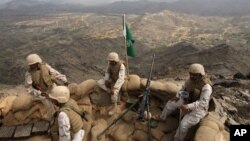Far from war-damaged Sanaa and Aden, Lieutenant Colonel Hamed al-Ahmari stood atop a Saudi border post and gestured across a valley to a Yemeni mountainside held by the Houthi militia, whose positions the kingdom's jets have bombarded for 12 days.
“We are in the front line,” said Ahmari, wearing the gray camouflage fatigues of the Border Guards, a force whose uniform has been augmented since the air strikes started on March 26 with a flak jacket and helmet.
What once may have been a debatable point — Yemen's messy war has many front lines — as gained credibility as the war has ground on: Three Saudi border guards have been killed along the frontier in that period, as the kingdom's air strikes and artillery fire targeted Houthi positions near its territory, as well as forces elsewhere in Yemen.
Concerns about the border with Yemen were central to the kingdom's campaign to stop the Houthis controlling its southern neighbor, something Riyadh fears would strengthen its main foe, Iran, and heighten security risks.
Saudi Arabia believes the Houthis, who follow the Zaydi Shi'ite sect, will incite sectarian violence as they advance into Sunni areas, strengthening support for Yemen's al-Qaida wing, which last July raided a Saudi border town, killing 12.
The mountaintop al-Mushareq post has not been attacked since the strikes began, Ahmari said, but while it is out of range of the light assault rifles most common in Yemen, it could be hit by more serious weapons that the Houthis possess.
All appeared quiet on Monday, but distant artillery fire had sounded throughout Sunday night, said a Reuters photographer staying near the frontier.
Saudi Arabia has strongly reinforced its southern border with army units, and the constant southwards movement of armor described by residents of border provinces has raised rumors it might conduct a large ground operation.
Ambush terrain
A few dozen military vehicles, painted in drab, including ambulances with the Red Crescent symbol stenciled on their sides, were parked in an army camp just behind the border. To the side, some artillery pieces pointed towards Yemen.
A dirt track climbed into the foothills, up a steep mountainside of crumbling rocks and broken boulders, where scraggly trees and cactuses clung to the sharp folds in the terrain.
The difficulty of sending an army into such territory against a guerrilla movement expert in the arts of ambush means any wide scale offensive in this mountainous region is highly unlikely, officials say privately. Land operations further east, where the highlands make way for desert, might be less daunting.
New border defenses are being built. But a score of bulldozers and diggers constructing a fenced patrol road that was to be finished in two years will now lie still until the war is over.
Since Reuters' last visit to al-Mushareq in November, the number of guards has increased and been reinforced by members of the Royal Saudi Land Forces in their brown camouflage fatigues.
All now wear body armor, and their posts are buttressed by sandbags. A troupe of baboons that played nearby has retired to more peaceful surroundings.
On that tour of the border, Reuters was also taken to a frontier post across a dry wadi from the caramel-colored mud buildings of Souq al-Mashnaq, a small arms market controlled by the Houthis, where their slogans were daubed on walls.
It had appeared a sleepy place, where the cries of children could be heard in the distance and herders grazed their cattle along the green sides of the wadi, but last week it was struck by missiles from a Saudi Apache attack helicopter, Ahmari said.
One goal of the campaign is to destroy Houthi positions near the border and prevent the militia from moving equipment towards Saudi Arabia, its spokesman has said.
Energy kingpin and impoverished neighbor
On the road towards the border, on the sandy Tihama coastal plain, a truck was being loaded with bales of hay by men dressed in the bright headscarf and colorful “futeh” sarong, held at the waist by a curved dagger, favored in the Yemeni highlands.
The border between Saudi Arabia and Yemen was only legally defined in 2000 after decades of disagreement and the people on either side are closely bound by ties of common blood and culture.
In the past six months in Jizan Province, the most populous of the three that border Yemen, Saudi authorities have stopped 77,885 people trying to cross illegally from Yemen, seizing 3,563 guns, seven hand grenades and 2.2 kilograms of explosives.
The divergence of fortunes between Saudi and Yemeni residents of the border district is even evident on the mountaintop where the Mushareq border post is located.
Through their binoculars, the guards watch Yemeni settlements with no electricity before retiring to an air-conditioned sitting area, furnished with tassled red-and-gold cushions, with windows that look out across the frontier.






